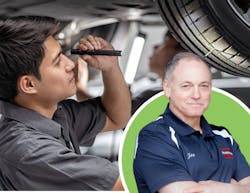Marconi: Is it Time to Rethink the Definition of Master Technician?
Five years ago, I hired a technician who immigrated from Europe. We’ll call him Paul. From his extensive training and work experience, Paul became highly proficient in brakes, axles, wheel alignment, ride handling, preventive maintenance services, tire pressure monitoring systems, suspension, and steering.
Paul did not perform any check engine light diagnosis, transmission repair, engine repair, or electrical testing. It’s not because he wasn’t competent. Paul focused on specific areas and mastered his skills in those areas. After a few months, we realized the value Paul brought to the shop. He earned the status of master technician and was paid accordingly.
I know what many of you are thinking. Paul does not fit the classic definition of a master-level technician. After all, to be a true master-level tech, one must perform complex electrical testing, check-engine light repair, and solve tough driveability problems. Right? Well, I’m not too sure anymore.
At the time, I also employed two techs that fit the traditional description of a master technician. Both were highly skilled in electronics, onboard computer diagnostics, reprogramming, and drivability problems. However, these techs would often avoid performing work other than what they considered more suited to their areas of expertise. It wasn’t out of arrogance. These technicians just felt more comfortable in areas they excelled at. The reality was that they could not perform the work that Paul could at the same level of expertise. On the other hand, Paul shied away from jobs he didn’t feel comfortable with. People tend to gravitate to areas in which they have a natural-born talent.
I’m not sure how the term master-level technician came about. Perhaps it dates back to the old time labor guides that defined jobs in degrees of difficulty: A, B, or C level. However, automotive servicing and repairs have become much more complex over the last few decades. The training for hybrids and electric vehicles is vastly different from what was needed on cars of the past. Plus, electronics dominate nearly every system in all automobiles these days.
It’s time we rethink our definition of what we consider a master-level technician. Being proficient in all areas on all makes and models is virtually impossible. Also, master-level classification should no longer be limited to those who become highly skilled in electrical systems or driveability problems. A technician performing tire mounting, balancing, and wheel alignments, must be proficient with tire pressure monitoring systems, steering angle sensor reprogramming, and an understanding of ADAS. Even balancing low-profile tires, performing brake jobs with electronic brake calipers, and so-called basic oil changes require more training and skill than just a decade ago. It’s a safe bet that soon, there will be technicians specializing in specific areas of automotive repair.
Our industry is rapidly changing. It’s crucial for our future that we attract and keep quality people and offer them exciting opportunities in all areas of automotive service and repairs. We must also be fair and reward those technicians who excel in areas other than what we traditionally determined were master-level achievements. This means that our definitions, pay structures, and classifications must change also. Technicians that train and focus on specific skills will become highly proficient in those areas, rather than attempting to become competent in all areas of automotive repair.
In the medical profession, there are internists, pediatricians, radiologists, neurologists, and more designations. They are all called doctors, but each acquires proficiency in a specific area of the human body. This career structure should be considered in the automotive profession, too.
Paul was still working for us when I sold my company in December of 2021. His focus remained on his areas of expertise, and he continued to excel in those areas. When one of the other techs had an issue with a persistent pull to the right, TPMS reprogramming question, steering angle sensor problem, or electronic brake issue, who do you think they asked to help them?
About the Author

Joe Marconi
Joe Marconi has more than four decades of experience in the automotive repair industry. He is the owner of Osceola Garage in Baldwin Place, N.Y., a business development coach for Elite Worldwide, and co-founder of autoshopowner.com.
